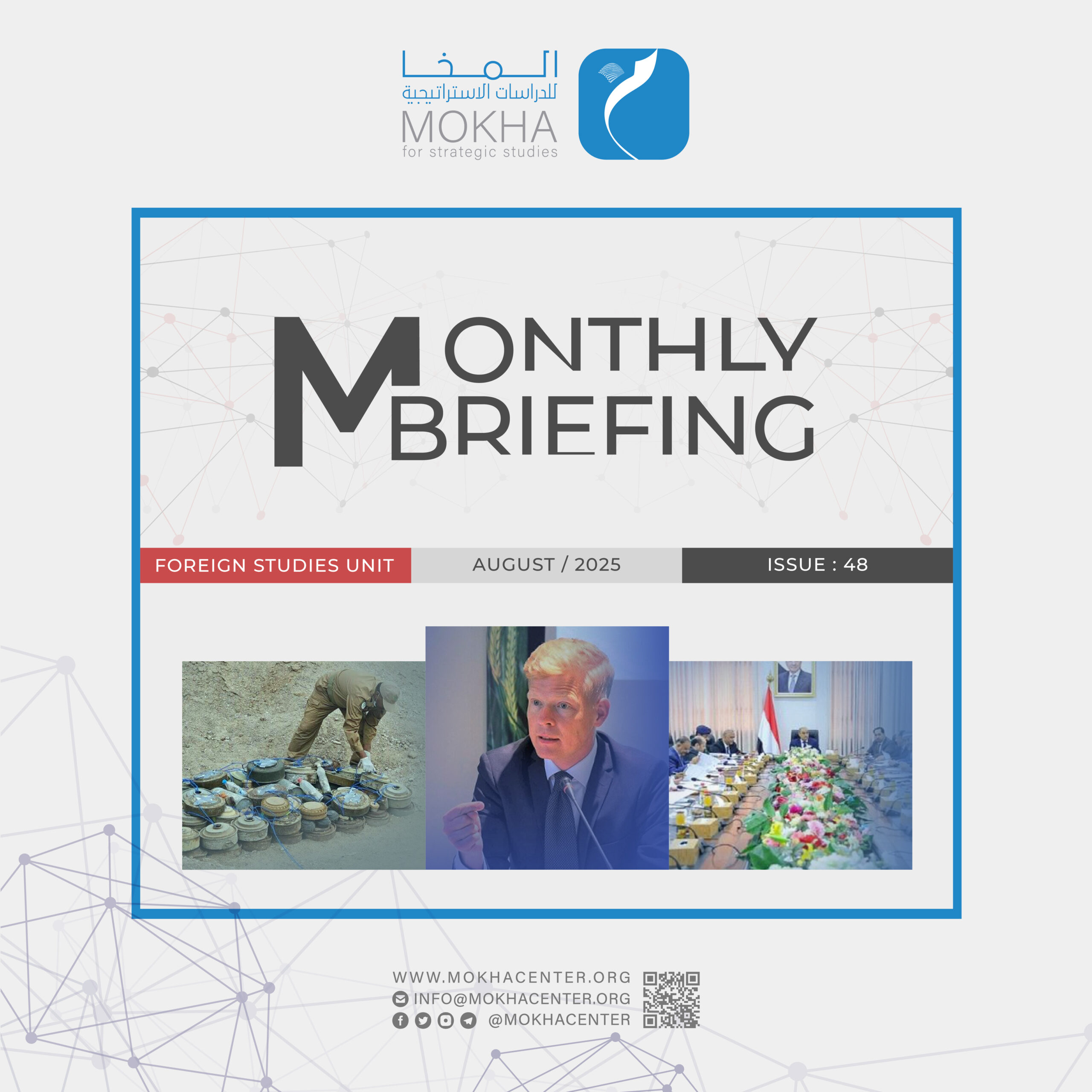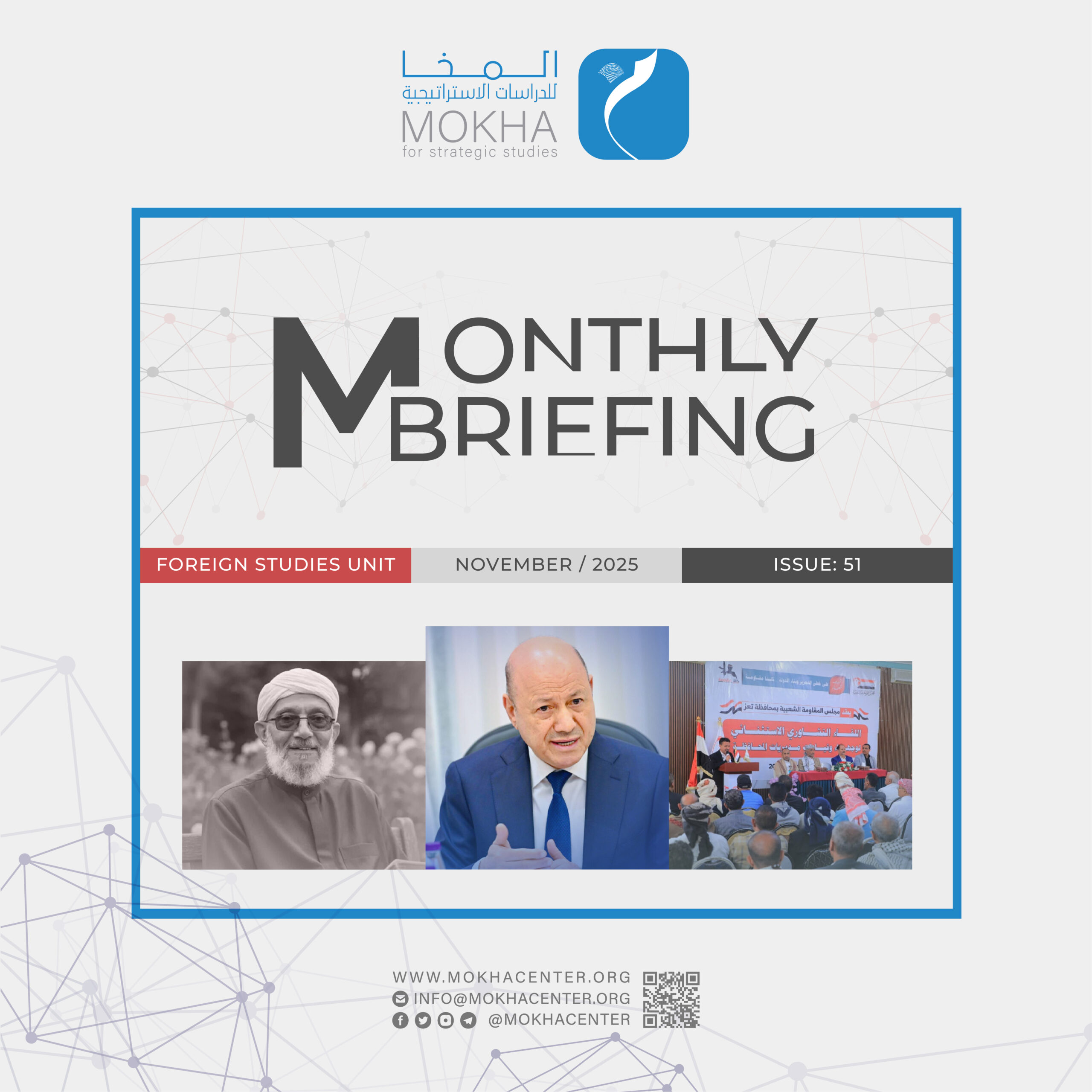Monthly Briefing/ August– 2025

Political scene
The United Nations envoy led intensive diplomatic efforts to promote peace in Yemen; however, these initiatives were hindered by continued Houthi escalation against domestic rivals. The conflict also widened to a regional scale through Houthi operations in the Red Sea and attacks on Israel, underscoring the complexity of the crisis and the enduring challenge of achieving a comprehensive and lasting political settlement.
- The UN envoy’s office held a meeting in Amman with the Yemeni government and joint forces to discuss a possible ceasefire and related security measures. Talks focused on de-escalation, infrastructure protection, and a comprehensive ceasefire, though the Houthis were notably absent from the discussions. Aug 11
- The Houthis made their first public appearance in Karbala, Iraq, during the Mashaya procession, where they set up stalls displaying slogans, images of their dead, books, and distributed food. This unusual outreach to Iranian allies in Iraq sparked strong criticism from Yemenis, who condemned the display amid worsening conditions at home. Aug 14
- The chairman of the PLC Rashad al-Alimi said peace in Yemen begins with dismantling the Houthis’ sectarian ideology and military structure. In his meeting with UN envoy Grundberg, he stressed the crisis is structural, not technical, urging the UN to create conditions for lasting peace. Aug 20
- Houthis kidnapped GPC Secretary-General Ghazi Ahmed Ali al-Ahwal and besieged the home of party chairman Sadeq Abu Ras, with reports of additional arrests of party leaders ahead of the party’s anniversary. Aug 20
- The GPC annulled the appointment of Brig. Gen. Ahmed Ali Abdullah Saleh as deputy leader and expelled him from the party, according to leader Hussein Hazeb. The decision highlighted internal divisions and underscored tensions with the Houthis, who remained wary of Saleh’s return following the lifting of UN sanctions. Aug 28
Military scene
August witnessed a sharp escalation, marked by intense Israeli airstrikes on vital sites in Sanaa, alongside progress in mine clearance projects that freed large areas of Yemeni land. These developments highlight both the ongoing regional conflict and the lasting threat of explosives to civilians.
- The Masam demining project has cleared 507,588 explosive devices since its launch—including landmines, unexploded ordnance, and IEDs—covering more than 68 million square meters. Meanwhile, Houthis continue to plant mines indiscriminately, making Yemen one of the world’s most contaminated countries. Aug 3
- Israeli warplanes carried out over 50 airstrikes on Sanaa, targeting military sites, oil, gas, and power facilities—including the Sixty Street oil station, Haziz power plant, and the presidential palace complex. The strikes, involving 14 aircraft, triggered fires and explosions in response to Houthi missile attacks on Israel. Aug 24
- Powerful explosions rocked Sanaa as Israeli strikes hit Houthi positions in Attan mountain and other areas. Reports of senior casualties were denied by the Houthis, who claimed civilian sites were targeted. Israeli media described the operation as “exceptional” and linked it to an assassination plan. The attack came as Israel announced shooting down two drones launched from Yemen, a day after a Houthi ballistic missile targeted Ben Gurion Airport. Aug 28
- The Houthis confirmed the death of their Prime Minister, Ahmed Ghaleb al-Rahwi, along with several ministers, and injuries to others in the Israeli airstrikes on Sanaa on Aug 28. The admission came after initial denials, with the group stating the attack struck a closed leadership meeting. Aug 30
Security scene
The security situation remained fragile, marked by both physical and cyber threats. Assassinations targeting security officials indicated ongoing instability and active extremist cells, while organized attacks on critical infrastructure revealed a new dimension of the conflict, disrupting essential services and exposing serious security vulnerabilities.
- A cyberattack caused a 20-minute outage of landline internet across several Yemeni governorates, while 4G service remained disrupted. Experts warned of further attacks targeting the Houthi-controlled “Yemen Net,” following previous breaches of vital systems, banks, and service institutions in Sanaa. Aug 11
- Hackers identifying as “S4uD1Pwnz” claimed to have breached the Houthi-run Red Sea Ports Authority, stealing data on over 30,000 commercial shipments and sensitive employee and manager information. The group reported disabling and altering the system, while the authority issued no official response. Aug 19
Economic scene
The economic front has become a major battleground, characterized by a fierce “currency war” between the internationally recognized government and Houthi authorities. Both sides implemented conflicting monetary policies: the Central Bank in Aden enforced strict measures to control the exchange market and mandate the use of the national currency. While intended to stabilize the economy, these measures deepened Yemen’s economic and banking divide.
- The Central Bank in Aden introduced a new mechanism to regulate and finance imports, enhancing transparency and exchange control by channeling foreign currency operations through licensed banks and exchange companies, aiming to stabilize finances and curb smuggling and speculation. Aug 8
- The Cabinet approved Decision No. 13 of 2025, banning the use of foreign currencies as a substitute for the Yemeni rial in all commercial, service, and financial contracts in liberated areas. Ministers and governors were tasked with monitoring compliance and referring violators to competent authorities. Aug 12
- the Cabinet in Aden mandated that commercial and real estate transactions be conducted in rials to support currency stability. It also ordered price controls, anti-monopoly measures, and investment incentives, including in pharmaceuticals and a Hadramawt refinery, while stressing the need to counter Houthi economic warfare. Aug 6
- The Houthi-controlled Central Bank in Sanaa instructed banks and exchange companies not to process traders’ requests via the Aden government mechanism, threatening violators. This was seen as a retaliatory and escalatory measure that could disrupt trade and threaten banking stability. Aug 19
- Houthi-controlled ports reported a 20% drop in fuel and food imports during the first seven months of 2025, receiving only 3.7 million metric tons. The World Food Program attributed the decline to damaged infrastructure from U.S. and Israeli airstrikes and warned of worsening food and fuel shortages and growing humanitarian risks. Aug 27
/toggle]
Violations
Human rights violations remain a serious concern across Yemen, encompassing systematic property confiscation, forced confessions, arbitrary arrests of journalists, activists, and academics, and direct targeting of civilians, particularly women and children.
- The Houthis launched the second phase of military training courses for academics and administrators at Sanaa universities, including theoretical and practical instruction on light and medium weapons under strict supervision. Aug 1
- Human Rights Watch condemned the Houthis for broadcasting “false” confessions of the crew of the ship Eternity Sea, held for weeks, calling it a war crime and a violation of human dignity, and demanded the immediate release of ten crew members. Aug 2
- The Rights and Freedoms Observatory expressed concern over rising abductions by the Houthis in Ibb governorate, documenting 95 kidnappings of academics, doctors, and engineers over the past two months, denouncing UN silence and urging the internationally recognized government to formally protest. Aug 4
- Local authorities in Marib released journalist Hamoud Hazzaa after three days of detention; he returned home to Al-Jufaina camp with wide support from colleagues and human rights activists. Aug 19
- The Mothers of the Abducted Association condemned the Houthi abduction of over 100 GPC members in Sanaa, including Secretary-General Ghazi Al-Ahwal, plus 187 citizens in Ibb and Hodeidah, calling it a crime against humanity and demanding the immediate release of all detainees. Aug 26
- The National Authority for Prisoners and Detainees reported “horrific” violations against Houthi detainees in Sanaa prisons, including physical and psychological torture, denial of medical care, and removal of blankets in winter, describing it as a “slow death policy,” and called on the UN and international organizations for urgent intervention. Aug 27
Lawyer Huda Al-Sarari reported that the Houthis kidnapped students from Omar Bin Abdulaziz High School in Al-Bayda for missing sectarian and military training imposed by the school over the past month. The students were released after parental assurances, highlighting the transformation of schools into recruitment camps at the expense of education. Aug 27
Humanitarian scene
The humanitarian crisis in Yemen has reached alarming levels, with the United Nations issuing dire warnings of imminent famine threatening millions, amid severe funding shortfalls for relief operations. Maritime tragedies continued, with more migrants drowning off Yemeni coasts, while remnants of war, particularly landmines, continue to claim civilian lives—especially children—highlighting the ongoing suffering of the most vulnerable.
- Over 50 African migrants drowned off the coast of Abyan in southern Yemen, 10 were rescued, and others remain missing after a boat carrying around 150 migrants capsized due to bad weather, amid UN warnings about the growing dangers of the eastern migration route. Aug 3
The UN Office for the Coordination of Humanitarian Affairs warned that, starting September, 18 million people in Yemen will face severe hunger, including 41,000 at risk of full famine, while funding shortages cover only 10.5 million people. The alert highlights ongoing economic collapse and the continuation of war. Aug 24
General News
- UNESCO added 26 new Yemeni heritage sites—cultural, natural, and historical—to its tentative World Heritage list, raising the total to 35 sites after updating five previous entries. Yemeni experts coordinated the dossiers with the UNESCO regional office, the Arab Center for World Heritage, and Yemen’s UNESCO delegation. Aug 1
- The president of the Houthi-aligned University of Science and Technology, Al-Qasim Muhammad Abbas Sharafuddin, appointed his sons and close associates to senior administrative positions following the resignation of the vice president and secretary-general over disputes and threats, reflecting the group’s ongoing control of the university to serve its sectarian and political agenda since 2020. Aug 4

